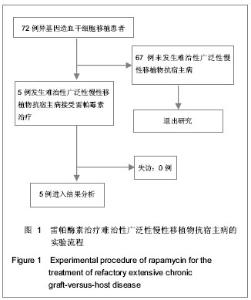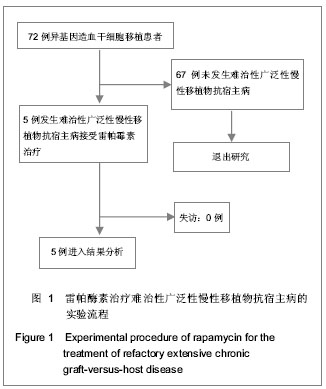Chinese Journal of Tissue Engineering Research ›› 2013, Vol. 17 ›› Issue (18): 3287-3294.doi: 10.3969/j.issn.2095-4344.2013.18.009
Previous Articles Next Articles
Rapamycin for the treatment of refractory extensive chronic graft-versus-host disease
Li Xu-dong, He Yi, Wang Dong-ning, Hu Yuan, Wang Wen-wen, Zhang Xiang-zhong, Lin Dong-jun
- Department of Hematology, the Third Affiliated Hospital of Sun Yat-sen University, Institute of Hematology, Sun Yat-sen University, Guangzhou 510630, Guandong Province, China
-
Received:2013-01-21Revised:2013-02-22Online:2013-04-30Published:2013-04-30 -
Contact:Lin Dong-jun, Master, Professor, Doctoral supervisor, Department of Hematology, the Third Affiliated Hospital of Sun Yat-sen University, Institute of Hematology, Sun Yat-sen University, Guangzhou 510630, Guandong Province, China lindongjun0168@163.com -
About author:Li Xu-dong★, Master, Attending physician, Department of Hematology, the Third Affiliated Hospital of Sun Yat-sen University, Institute of Hematology, Sun Yat-sen University, Guangzhou 510630, Guandong Province, China Lixudong0323@sohu.com -
Supported by:Science and Technology Planning Project of Guangdong Province, No. 2010B080701006
CLC Number:
Cite this article
Li Xu-dong, He Yi, Wang Dong-ning, Hu Yuan, Wang Wen-wen, Zhang Xiang-zhong, . Rapamycin for the treatment of refractory extensive chronic graft-versus-host disease[J]. Chinese Journal of Tissue Engineering Research, 2013, 17(18): 3287-3294.
share this article
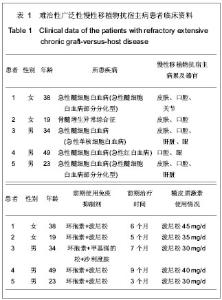
5例患者中急性髓细胞白血病4例(急性髓细胞白血病部分分化型2例,急性单核细胞白血病1例,急性红白血病1例),骨髓增生异常综合征1例,采用经典或改良马利兰联合环磷酰胺方案预处理后,行亲缘(同胞)全相合异基因外周血造血干细胞移植。5例经移植后临床检查均符合难治性广泛性慢性移植物抗宿主病的诊断标准,先使用环孢素联合糖皮质激素治疗,1例同时联合使用沙利度胺,治疗中位时间为6.0(3-9)个月,症状无改善或有改善但存在激素依赖(用量>30 mg/d,且不能减量),见表1。 2.2 难治性广泛性慢性移植物抗宿主病患者病情改善 5例患者中1例(例1)经雷帕霉素治疗8个月后获得完全缓解,皮肤、口腔及关节症状完全控制;3例(例2,3,4)患者明显改善,其中例2经治疗10个月后口腔症状完全控制,颜面部皮肤较治疗前明显改善,例3经治疗14个月后口腔、眼部症状明显改善,肝脏、皮肤症状均改善,例4口腔、眼部症状均明显改善;1例(例5)目前已经接受雷帕霉素治疗4个月,患者病情稳定,仍有皮肤、口腔及眼部症状,较使用雷帕霉素前有好转;总有效率为80%。 5例患者最终均减停激素,单独服用雷帕霉素维持,目前4例已停用(其中例3因髓外复发而停药),1例(例5)减量至雷帕霉素浓度在较低水平。"
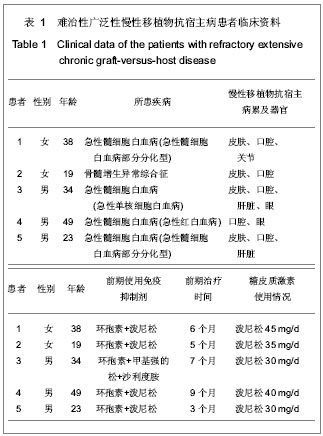
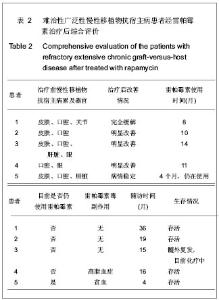
2.3 难治性广泛性慢性移植物抗宿主病患者随访情况 5例患者最长服用雷帕霉素时间为14个月,最短为4个月(目前仍在服用),中位服用时间为9.4个月。随访中位时间为18个月(4-38个月),随访期间5例患者均存活,例3于服用雷帕霉素14个月后出现髓外复发,目前在化疗中。 2.4 雷帕霉素治疗难治性广泛性慢性移植物抗宿主病的不良反应 雷帕霉素毒耐受性好,使用过程中没有因毒副作用终止治疗者。 1例(例4)患者出现高三酰甘油血症和高胆固醇血症(血清三酰甘油:2.08 mmol/L,血清总胆固醇:5.83 mmol/L),经治疗后恢复正常;1例(例5)出现贫血(血红蛋白最低达91 g/L),未出现需输血支持的患者;无出现肝功能损害及高血糖。 2.5 雷帕霉素治疗难治性广泛性慢性移植物抗宿主病的综合评价 雷帕霉素治疗难治性广泛性慢性移植物抗宿主病的综合评价见表2。"
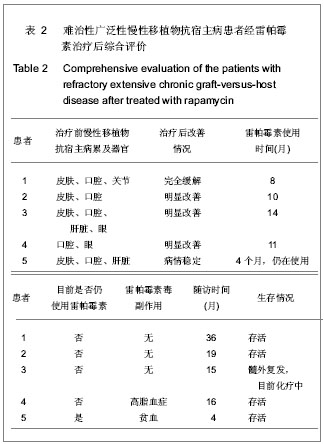
| [1] Sierra J, Martino R, Sánchez B, et al. Hematopoietic transplantation from adult unrelated donors as treatment for acute myeloid leukemia. Bone Marrow Transplant. 2008; 41(5):425-437.[2] Yang K, Liu QF, Fan ZP, et al. Zhonghua Neike Zazhi. 2007; 46(2):135-139.杨凯,刘启发,范志平,等.血缘与非血缘供者异基因造血于细胞移植治疗白血病的比较研究[J].中华内科杂志,2007,46(2):135-39.[3] Wang Y, Liu KY, Xu LP, et al. Zhonghua Neike Zazhi. 2007; 46(11):903-906.王昱,刘开彦,许兰平,等.异基因造血干细胞移植治疗高危恶性血液病[J].中华内科杂志,2007,46(11):903-906.[4] Yuan HL, Jiang M, Wen BZ, et al. Zhonghua Qiguan Yizhi Zazhi. 2010,31:79-83.袁海龙,江明,温丙昭,等.HLA单倍体相合与全相合外周血造血干细胞移植治疗恶性血液病的疗效比较[J].中华器官移植杂志,2010, 31:79-83.[5] Wang JB, Da WM, Zhang JP, et al. Zhonghua Xueye Xue Zazhi. 2010;31:505-509.王静波,达万明,张建平,等.强烈预处理异基因造血干细胞移植治疗高危难治性白血病[J].中华血液学杂志,2010,31: 505-509.[6] Cutler C, Giri S, Jeyapalan S, et al. Acute and chronic graft-versus-host disease after allogeneic peripheral-blood stem-cell and bone marrow transplantation: a meta-analysis. J Clin Oncol. 2001;19(16):3685-3691.[7] Zecca M, Prete A, Rondelli R, et al. Chronic graft-versus-host disease in children: incidence, risk factors, and impact on outcome. Blood. 2002;100(4):1192-1200.[8] Moon JH, Kim SN, Kang BW, et al. Early onset of acute GVHD indicates worse outcome in terms of severity of chronic GVHD compared with late onset. Bone Marrow Transplant. 2010;45(10):1540-1545. [9] Michálek J, Collins RH, Hill BJ, et al. Identification and monitoring of graft-versus-host specific T-cell clone in stem cell transplantation. Lancet. 2003;361(9364):1183-1185.[10] Sullivan KM, Witherspoon RP, Storb R, et al. Prednisone and azathioprine compared with prednisone and placebo for treatment of chronic graft-v-host disease: prognostic influence of prolonged thrombocytopenia after allogeneic marrow transplantation. Blood. 1988;72(2):546-554.[11] Browne PV, Weisdorf DJ, DeFor T, et al. Response to thalidomide therapy in refractory chronic graft-versus-host disease. Bone Marrow Transplant. 2000;26(8):865-869.[12] Busca A, Saroglia EM, Lanino E, et al. Mycophenolate mofetil (MMF) as therapy for refractory chronic GVHD (cGVHD) in children receiving bone marrow transplantation. Bone Marrow Transplant. 2000;25(10):1067-1071.[13] Carnevale-Schianca F, Martin P, Sullivan K, et al. Changing from cyclosporine to tacrolimus as salvage therapy for chronic graft-versus-host disease. Biol Blood Marrow Transplant. 2000;6(6):613-620.[14] Sleight BS, Chan KW, Braun TM, et al. Infliximab for GVHD therapy in children. Bone Marrow Transplant. 2007;40(5): 473-480. [15] Couriel DR, Saliba R, Escalón MP, et al. Sirolimus in combination with tacrolimus and corticosteroids for the treatment of resistant chronic graft-versus-host disease. Br J Haematol. 2005;130(3):409-417.[16] Yamane T, Yamamura R, Aoyama Y, et al. Infliximab for the treatment of severe steroid refractory acute graft-versus-host disease in three patients after allogeneic hematopoietic transplantation. Leuk Lymphoma. 2003;44(12):2095-2097.[17] Chen XQ, Jin YY, Tang G. Beijing: People’s Medical Pubishing House. 2011.陈新谦,金有豫,汤光.新编药物学[M].17版.北京:人民卫生出版社, 2011.[18] Lin FR, Yao EG. Guowai Yixue: Shuxue ji Xueye Xue Fence. 2006;29(3):266-269.林凤茹,姚尔固,雷帕霉素在血液病中的应用[J].国外医学:输血及血液学分册,2006,29(3):266-269.[19] MacDonald AS; RAPAMUNE Global Study Group. A worldwide, phase III, randomized, controlled, safety and efficacy study of a sirolimus/cyclosporine regimen for prevention of acute rejection in recipients of primary mismatched renal allografts. Transplantation. 2001;71(2): 271-280.[20] Hymes LC, Warshaw BL. Sirolimus in pediatric patients: results in the first 6 months post-renal transplant. Pediatr Transplant. 2005;9(4):520-522.[21] Seikaly M, Ho PL, Emmett L, et al. The 12th Annual Report of the North American Pediatric Renal Transplant Cooperative Study: renal transplantation from 1987 through 1998. Pediatr Transplant. 2001;5(3):215-231.[22] Hertz MI, Taylor DO, Trulock EP, et al. The registry of the international society for heart and lung transplantation: nineteenth official report-2002. J Heart Lung Transplant. 2002; 21(9):950-970.[23] Wang Z, Fan J. Guowai Yixue: Yizhi yu Xueye Jinghua Fenxce. 2004;2(5):33-35.王征,樊嘉.雷帕霉素在器官移植中的研究进展[J].国外医学:移植与血液净化分册,2004,2(5):33-35.[24] Antin JH, Kim HT, Cutler C, et al. Sirolimus, tacrolimus, and low-dose methotrexate for graft-versus-host disease prophylaxis in mismatched related donor or unrelated donor transplantation. Blood. 2003;102(5):1601-1605. [25] McAlister VC, Gao Z, Peltekian K, et al. Sirolimus-tacrolimus combination immunosuppression. Lancet. 2000;355(9201): 376-377.[26] Filipovich AH, Weisdorf D, Pavletic S, et al. National Institutes of Health consensus development project on criteria for clinical trials in chronic graft-versus-host disease: I. Diagnosis and staging working group report. Biol Blood Marrow Transplant. 2005;11(12):945-956.[27] Fu CC, Wu DP, Sun AN, et al. Suzhou Daxue Xuebao: Yixue Ban. 2007;27(2):227-229.傅琤琤,吴德沛,孙爱宁,等.雷帕霉素对难治性广泛型慢性移植物抗宿主病的疗效观察(附7例报告)[J].苏州大学学报:医学版, 2007, 27(2):227-229.[28] Arora M, Burns LJ, Davies SM, et al. Chronic graft-versus-host disease: a prospective cohort study. Biol Blood Marrow Transplant. 2003;9(1):38-45.[29] Cutler C, Li S, Ho VT, et al. Extended follow-up of methotrexate-free immunosuppression using sirolimus and tacrolimus in related and unrelated donor peripheral blood stem cell transplantation. Blood. 2007;109(7):3108-3114.[30] Baron F, Maris MB, Sandmaier BM, et al. Graft-versus-tumor effects after allogeneic hematopoietic cell transplantation with nonmyeloablative conditioning. J Clin Oncol. 2005;23(9): 1993-2003.[31] Lee SJ, Vogelsang G, Flowers ME. Chronic graft-versus-host disease. Biol Blood Marrow Transplant. 2003;9(4):215-233.[32] Lee SJ. New approaches for preventing and treating chronic graft-versus-host disease. Blood. 2005;105(11): 4200-4206.[33] Fiuza-Luces C, González-Murillo A, Soares-Miranda L, et al. Effects of exercise interventions in graft versus host disease models. Cell Transplant. 2012.in press. [34] Laskowska K, Burzyńska-Makuch M, Krenska A, et al. Pneumatosis cystoides interstitialis: A complication of graft-versus-host disease. A report of two cases. Pol J Radiol. 2012;77(2):60-63. [35] Kim TH, Lee HH, Chung SH. Hematocolpos as a complication of chronic graft-versus-host disease. Taiwan J Obstet Gynecol. 2012;51(2):292-293. [36] Wolff D, Bertz H, Greinix H, et al. The treatment of chronic graft-versus-host disease: consensus recommendations of experts from Germany, Austria, and Switzerland. Dtsch Arztebl Int. 2011;108(43):732-740. [37] Martin PJ, Inamoto Y, Carpenter PA, et al. Treatment of chronic graft-versus-host disease: Past, present and future. Korean J Hematol. 2011;46(3):153-163.[38] Lazar J, Poonawalla T, Teng JM. A case of sclerodermatous graft-versus-host disease responsive to imatinib therapy. Pediatr Dermatol. 2011;28(2):172-175. [39] Wood W, Garg S, Adamus G, et al. Alloimmune retinopathy associated with antibodies to transducin-alpha as a complication of chronic graft-versus-host disease. Biol Blood Marrow Transplant. 2010;16(1):135-138. [40] Fofi C, Barberi S, Stoppacciaro A, et al. Focal segmental glomerulosclerosis as a complication of graft-versus-host disease. Nat Rev Nephrol. 2009;5(4):236-240. [41] Ferrara JL, Levine JE, Reddy P, et al. Graft-versus-host disease. Lancet. 2009;373(9674):1550-1561. [42] del Pozo J, García-Silva J, Yebra-Pimentel MT. Chronic graft-versus-host disease presenting as bullous lesions. Actas Dermosifiliogr. 2008;99(10):803-807. [43] Fraser CJ, Scott Baker K. The management and outcome of chronic graft-versus-host disease. Br J Haematol. 2007; 138(2): 131-145.[44] Parker PM, Openshaw H, Forman SJ. Myositis associated with graft-versus-host disease. Curr Opin Rheumatol. 1997; 9(6): 513-519.[45] Luo H, Ke D. Zhongguo Bingli Shengli Zazhi. 2011;27(12): 2423-2428.罗浩,柯丹.移植物抗宿主病和移植物抗白血病效应的发生机制及分离策略的研究进展[J].中国病理生理杂志,2011,27(12): 2423-2428.[46] van der Straaten HM, Fijnheer R, Dekker AW, et al. Relationship between graft-versus-host disease and graft-versus-leukaemia in partial T cell-depleted bone marrow transplantation. Br J Haematol. 2001;114(1):31-35.[47] Koh LP, Chen CS, Tai BC, et al. Impact of postgrafting immunosuppressive regimens on nonrelapse mortality and survival after nonmyeloablative allogeneic hematopoietic stem cell transplant using the fludarabine and low-dose total-body irradiation 200-cGy. Biol Blood Marrow Transplant. 2007;13(7): 790-805. [48] Nordlander A, Mattsson J, Ringdén O, et al. Graft-versus-host disease is associated with a lower relapse incidence after hematopoietic stem cell transplantation in patients with acute lymphoblastic leukemia. Biol Blood Marrow Transplant. 2004;10(3):195-203.[49] Zhang XH, Fu HX, Liu KY, et al. Zhonghua Xueye Xue Zazhi. 2010;31(5):323-327.张晓辉,付海霞,刘开彦,等.异基因造血干细胞移植后白血病复发伴活动性移植物抗宿主病患者的临床研究[J].中华血液学杂志,2010,31(5):323-327.[50] Vogelsang GB. How I treat chronic graft-versus-host disease. Blood. 2001;97(5):1196-1201.[51] Salmasian H, Rohanizadegan M, Banihosseini S, et al. Corticosteroid regimens for treatment of acute and chronic graft versus host disease (GvHD) after allogenic stem cell transplantation. Cochrane Database Syst Rev. 2010;(1): CD005565. [52] Gaziev D, Lucarelli G. Novel approaches to the treatment of chronic graft-versus-host disease. Expert Opin Investig Drugs. 2001;10(5):909-923. [53] Wang LH, Ren HY, Qiu Z, et al. Zhonghua Xueye Xue Zazhi. 2011;32(2):118-120.王莉红,任汉云,邱志,等.血缘供者造血干细胞移植后患者上消化道移植物抗宿主病临床特征及小剂量激素疗效分析[J].中华血液学杂志,2011,32(2):118-120.[54] Piñana JL, Valcárcel D, Fernández-Avilés F, et al. MTX or mycophenolate mofetil with CsA as GVHD prophylaxis after reduced-intensity conditioning PBSCT from HLA-identical siblings. Bone Marrow Transplant. 2010;45(9):1449- 1456. [55] Lai Y, Ma J, Schwarzenberger P, et al. Combination of CsA, MTX and low-dose, short-course mycophenolate mofetil for GVHD prophylaxis. Bone Marrow Transplant. 2009;43(1): 61-67. [56] Huang K, Li Y, Huang SL, et al. Prophylaxis and treatment of chronic graft versus host disease. Zhonghua Er Ke Za Zhi. 2005;43(3):174-177. [57] Iravani M, Mousavi A, Gholibeikian S, et al. Cyclosporin A and mini short-term methotrexate vs cyclosporin A as graft-versus-host disease prophylaxis in patients with beta thalassemia major undergoing allogeneic blood and marrow transplantation. Bone Marrow Transplant. 2005;35(11): 1095-1099. [58] Neumann F, Graef T, Tapprich C, et al. Cyclosporine A and mycophenolate mofetil vs cyclosporine A and methotrexate for graft-versus-host disease prophylaxis after stem cell transplantation from HLA-identical siblings. Bone Marrow Transplant. 2005;35(11):1089-1093. [59] Liu QF, Sun J, Zhang Y, et al. Quadruple therapy with CsA, MTX, MMF and ATG for preventing graft-versus-host disease in unrelated donor hematopoietic stem cell transplantation. Di Yi Jun Yi Da Xue Xue Bao. 2003;23(11):1143-1145. [60] Koga Y, Nagatoshi Y, Kawano Y, et al. Methotrexate vs Cyclosporin A as a single agent for graft-versus-host disease prophylaxis in pediatric patients with hematological malignancies undergoing allogeneic bone marrow transplantation from HLA-identical siblings: a single-center analysis in Japan. Bone Marrow Transplant. 2003;32(2): 171-176. [61] Finke J. Chronic graft versus host disease (GvHD): causes, manifestation, diagnosis and treatment option. Dtsch Med Wochenschr. 2012;137(42):2166-2170. [62] Pidala J, Tomblyn M, Nishihori T, et al. Sirolimus demonstrates activity in the primary therapy of acute graft-versus-host disease without systemic glucocorticoids. Haematologica. 2011;96(9):1351-1356. [63] Pidala J, Kim J, Roman-Diaz J, et al. Pentostatin as rescue therapy for glucocorticoid-refractory acute and chronic graft-versus-host disease. Ann Transplant. 2010;15(4): 21-29. [64] Wolff D, Gerbitz A, Ayuk F, et al. Consensus conference on clinical practice in chronic graft-versus-host disease (GVHD): first-line and topical treatment of chronic GVHD. Biol Blood Marrow Transplant. 2010;16(12):1611-1628.[65] Koc S, Leisenring W, Flowers ME, et al. Therapy for chronic graft-versus-host disease: a randomized trial comparing cyclosporine plus prednisone versus prednisone alone. Blood. 2002;100(1):48-51.[66] von Bonin M, Oelschlägel U, Radke J, et al. Treatment of chronic steroid-refractory graft-versus-host disease with low-dose rituximab. Transplantation. 2008;86(6):875-879. [67] Kharfan-Dabaja MA, Mhaskar AR, Djulbegovic B, et al. Efficacy of rituximab in the setting of steroid-refractory chronic graft-versus-host disease: a systematic review and meta-analysis. Biol Blood Marrow Transplant. 2009;15(9): 1005-1013.[68] Johnston LJ, Brown J, Shizuru JA, et al. Rapamycin (sirolimus) for treatment of chronic graft-versus-host disease. Biol Blood Marrow Transplant. 2005;11(1):47-55.[69] Jurado M, Vallejo C, Pérez-Simón JA, et al. Sirolimus as part of immunosuppressive therapy for refractory chronic graft-versus-host disease. Biol Blood Marrow Transplant. 2007;13(6):701-706.[70] Jedlickova Z, Burlakova I, Bug G, et al. Therapy of sclerodermatous chronic graft-versus-host disease with mammalian target of rapamycin inhibitors. Biol Blood Marrow Transplant. 2011;17(5):657-663. [71] Cai Y, Wang C, Yang J, et al. Neike Lilun yu Shijian. 2011;6(1): 56-59.蔡宇,王椿,杨隽,等.西罗莫司治疗激素依赖或耐药的皮肤和口腔移植物抗宿主病的临床观察[J].内科理论与实践,2011,6(1): 56-59. |
| [1] | Xie Yang, Zhang Shujiang, Liu Menglan, Luo Ying, Yang Yang, Li Zuoxiao. Mechanism by which rapamycin protects spinal cord neurons in experimental autoimmune encephalomyelitis mice [J]. Chinese Journal of Tissue Engineering Research, 2021, 25(5): 695-700. |
| [2] | Yang Xin, Jin Zhe, Feng Xu, Lu Bing. The current situation of knowledge and attitudes towards organ, eye tissue, body donation of residents in Shenyang [J]. Chinese Journal of Tissue Engineering Research, 2021, 25(5): 779-784. |
| [3] | Xu Hui, Kang Bingxin, Zhong Sheng, Gao Chenxin, Zhao Chi, Qiu Guowei, Sun Songtao, Xie Jun, Xiao Lianbo, Shi Qi. Pressing local acupoints plus adjustion of the knee joint in a sitting position for treating knee osteoarthritis: a randomized controlled trial [J]. Chinese Journal of Tissue Engineering Research, 2021, 25(2): 216-221. |
| [4] | Chen Xiao, Guo Zhi, Chen Lina, Liu Xuanyong, Zhang Yihuizhi, Li Xumian, Wang Yueqiao, Wei Liya, Xie Jing, Lin Li. Factors affecting the mobilization and collection of autologous peripheral blood hematopoietic stem cells [J]. Chinese Journal of Tissue Engineering Research, 2021, 25(19): 2958-2962. |
| [5] | Liu Pengran, Jiao Rui, Tao Jin, Chen Hui, Dai Jihang, Yan Lianqi. Comparison of the effects of total hip arthroplasty with different interface prostheses in the treatment of elderly hip diseases [J]. Chinese Journal of Tissue Engineering Research, 2021, 25(15): 2347-2351. |
| [6] | Cao Linlin, Ding Kaiyang, Song Hao, Wu Guolin, Hu Maogui, Fan Dandan, Zhou Chenyang, Wang Cuicui, Feng Yuanyuan. Efficacy and influencing factors of autologous hematopoietic stem cell transplantation in the treatment of malignant lymphoma [J]. Chinese Journal of Tissue Engineering Research, 2021, 25(13): 1993-1998. |
| [7] | Ma Long, Tan Xiaoxin, Sun Guoshao. A 5-year follow-up on sagittal alignment and radiological outcomes of consecutive three-level anterior cervical discectomy and fusion and hybrid surgery [J]. Chinese Journal of Tissue Engineering Research, 2021, 25(12): 1879-1885. |
| [8] | Ge Su, Zou Xiaobao, Ma Xiangyang, Wang Binbin, Yang Haozhi, Zhang Shuang, Ni Ling, Chen Yuyue, Xia Hong, Wu Zenghui. Design and application of fulcrum screws for atlantoaxial dislocation [J]. Chinese Journal of Tissue Engineering Research, 2020, 24(9): 1348-1352. |
| [9] | Peng Ruhui, Zhou Dechun. Application of tranexamic acid combined with tourniquet optimization program in total knee arthroplasty [J]. Chinese Journal of Tissue Engineering Research, 2020, 24(36): 5812-5817. |
| [10] | Li Yuanqi, Lin Hai, Luo Hongrong, Zhang Xingdong. Relationship between mitochondrial autophagy and chondrogenesis of bone marrow mesenchymal stem cells [J]. Chinese Journal of Tissue Engineering Research, 2020, 24(31): 4954-4960. |
| [11] | Zhang Suping, Sun Ling, Wan Dingming, Cao Weijie, Li Li, Liu Changfeng, Liu Yufeng, Wang Dao, Guo Rong, Jiang Zhongxing, Xie Xinsheng. Effectiveness of unrelated peripheral blood stem cell transplantation in the treatment of severe aplastic anemia [J]. Chinese Journal of Tissue Engineering Research, 2020, 24(31): 4994-5001. |
| [12] |
Shang Zhizhong, Jiang Yanbiao, Yao Lan, Wang Anan, Wang Hongxia, Tian Yuanxin, Liu Dengrui, Ma Bin .
Feasibility of stem cell therapy for renal ischemia/reperfusion injury: a systematic review based on animal experiments [J]. Chinese Journal of Tissue Engineering Research, 2020, 24(25): 4094-4100. |
| [13] | Fan Zhirong, Su Haitao, Jiang Tao, Zhou Junde, Peng Jiajie, Hong Weiwu, Zhou Lin, Huang Huida. Safety of intraarticular corticosteroid injections after arthroscopic shoulder surgery: a systematic review and meta-analysis [J]. Chinese Journal of Tissue Engineering Research, 2020, 24(24): 3931-3936. |
| [14] | Zhang Junhui, Xu Hualiang, Chang Hong, Lin Zhujian, Song Yancheng . Zero-profile anterior cervical ROI-C cage versus traditional fusion cage combined with titanium plate in treatment of two-level cervical spondylotic myelopathy [J]. Chinese Journal of Tissue Engineering Research, 2020, 24(21): 3329-3335. |
| [15] | Chen Rilan, Deng Kaifeng, Wei Xingcheng, Wang Hengsheng, Feng Jiaoqun, Yan Jiaxing, Gao Qianqian, Ma Yinglu, Zhu Ying. Effect of electro-acupuncture on pain relief and joint function in patients with knee osteoarthritis: a meta-analysis [J]. Chinese Journal of Tissue Engineering Research, 2020, 24(21): 3438-3444. |
| Viewed | ||||||
|
Full text |
|
|||||
|
Abstract |
|
|||||
